Glasgow Bioinformatics Summer School 2025
Update on 2025 course - One week with an extra single cell day (Saturday)
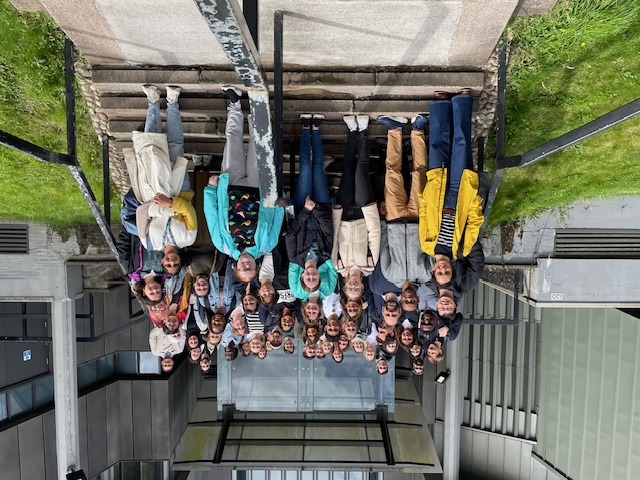
When:
18-22 of August 2025
Applications are open
Application Deadline: 01/07/2025
Topics:
First week (Bioinformatics of next-generation sequencing):
- Basics of Linux
- Introduction to R
- Introduction to next-generation sequencing
- Data visualization
- SNP analysis
- Transcriptomics: bulk RNA-Seq and single-cell RNA-Seq
- De novo assembly (alternative track to scRNA-Seq)
- Databases
- Grouptask to potentially work on own data
Single cell day (advanced single cell)*
- Applied theory of scRNA-seq analysis methods
- Integration of scRNA
- Spatial transcriptomic
- Tips and tricks - material to other application like BCR, pseudo time, cell-cell interation
Costs:
One week: £800 for academics / £1300 commercial
One week + Saturday: £ 900 for academics / £1450 commercial
How to apply: Places are assigned on a first-come, first-served basis upon receipt of the fee. Please contact sii-informatics@glasgow.ac.uk for the booking.
Cancellation Policy: Cancellations more than 30 days before the start date will incur a 30% cancellation fee. Cancellations less than 30 days before the start date cannot be refunded.
Participants are encouraged to attend the full week, daily, core hours 9:00-18:00h. We have 2 evening events.
* IMPORTANT:
The primary target audience is PhD students and postdocs from the life sciences.
Teacher of the previous courses:
Learning outcomes

After attending this course, participants should be able to:
- Comfortably work with state-of-the-art bioinformatics software in a Linux-like environment
- Have a good understanding of the application, opportunities, visualization and analysis of next-generation sequencing datasets
- Integrate and query large-scale genomic and functional genomic databases to answer biology-related research questions and develop testable hypotheses
- Experience analysing RNA-Seq and scRNA-Seq data
- Ideas around integrative analysis and how to run basic analysis in R
Please note: The practical sessions will be taught exclusively through Unix/Linux. Knowledge in Linux is helpful, but not required. The course aims to provide a hands-on introduction to bioinformatics for next-generation sequencing and should not be considered a complete education in the theoretical and mathematical foundations of the topics. This course is aimed at applicants solely interested in the analysis of NGS data and bioinformatics.
Full description
First week:
Next generation sequencing (NGS) and bioinformatics has become an essential tool in genetic and genomic analysis. It is increasingly important for experimental scientists to gain the bioinformatics skills required to assess and analyse the large volumes of sequencing data produced by next generation sequencers. With the ongoing omics initiatives, we would like to give PhD students and postdocs the opportunity to learn about NGS and bioinformatics.
This week-long course aims to provide experimental biologists working with omics data with (i) a comprehension of “bioinformatics” language and terminology, (ii) an understanding of the underlying concepts (iii) hands-on experience in genomic-scale data analysis for
- Linux: The operating system for most bioinformatics software. This part will also explain how to process data on the Glasgow high performance compute cluster (HPCC each participant will need an account, information to follow). This will allow participants to apply the knowledge they have gained in the future.
- NGS mapping and variant calling: Learn how to map sequencing reads and visualize the data. Find copy number and sequence variants and understand the different types of variation.
- Transcriptomics:
- Analyse a dataset by comparing the transcriptome of a knock-out versus a wildtype parasite - from the mapping of short reads, visualization, differential expression up to GO enrichment!
- Single cell RNA-Seq - basic introduction using Seurat and 10X Chromium data
- R is a statistical package based on a Linux like syntax. Many tools for genomics and transcriptomics analysis are written in R. We will explore using some of these tools and creating publication-ready figures in R
- Databases: Get an overview of the most common databases and learn how to download published data or perform simple analysis on them.
The data used during the workshop will be derived from bacteria, single celled parasites and human or mouse, but the learning outcomes can be applied to other organisms.
At the end of the course you will have the opportunity to work on a larger task with a group to gain experience of applying the learning outcomes of the course independently. If you wish to bring your own data for the group task, please contact the course organisers in advance.
Initially, participants will work from a virtual machine, which will be provided on a USB hard disc, and can be taken away at the end of the course at no additional cost. Some exercises will be taught on a computer server to practice connecting to servers.
Single cell Saturday
We will present defined pipelines to integrate scRNA-Seq, highlighting issues of normalisation, integration, annotation and differential gene expression.
Half a day will be dedicated to spatical biology, to apply the previous know ledge to methods such as CosMX or Xenium. (If participants don't want to do any spatial, rather focus more in scRNA-Seq, that will be possible)
Second Week not running this year, maybe next year.
About the organisers

Thomas Otto is a Senior lecturer for Bioinformatics at the University of Glasgow. He has a vast experience in NGS genomics, from the basics of sequencing technologies, quality control of data, genome and transcriptomic projects and genotype to phenotype projects.
Through his career, he taught many workshops on NGS genomics, including de novo assembly, Introduction to bioinformatics (Wellcome Trust advanced courses (WTAC)), more applied workshops like working with pathogen genomes or working with parasite databases. He also teaches at the University of Glasgow data analysis, R and transcriptomics for undergraduate and masters students.
Kathryn Crouch is a team leader for the bioinformatics team at the Wellcome Centre for Integrative Parasitology, University of Glasgow. Her background is in comparative immunology and she worked in the pharmaceutical industry for several years before taking up her current position.
In her current role, she manages a team providing advice and computational analysis to Wellcome Centre members working with NGS and other high throughput data in eukaryotic pathogens. She also develops software for the VEuPathDB suite of databases (https://veupathdb.org/). Teaching experience includes running an applied bioinformatics module on the MSc Bioinformatics at the University of Glasgow for the last three years, and contributing to applied courses including the Wellcome Trust Advanced Courses Working with Parasite Database Resources workshop for the last six years.
Kathryn and Thomas have run the annual first week of the Bioinformatics summer school together since 2018. Sadly no Kathryn this year..
Olympia Hardy graduated from the University of Southampton with a degree in Biomedical Science before undertaking an MSc in Bioinformatics at the University of Glasgow in 2019. She then worked as a bioinformatician focusing on the immune response in COVID-19.
Her PhD project aims to utilise bioinformatics to analyse single-cell RNA sequencing data to elucidate the evolution of cell-cell interactions that may play a key role in early disease onset to late-stage rheumatoid (RA) and psoriatic arthritis (PsA) and other inflammatory diseases.
She is currently developing an interactive visualisation method called cellXplore that will allow users to investigate cell-cell interactions without the need for prior bioinformatics experience. With this she has applied her knowledge of cell-cell interactions and single-cell to elucidate inflammatory diseases such as COVID-19, parasite infection and atlas-level data consisting of various chronic and acute diseases.
Her prior teaching experience consists of demonstrating on various bioinformatic modules run at the University of Glasgow since 2020 in addition to the Bioinformatics Summer School in previous years.
Ross Laidlaw graduated from the University of Glasgow in 2020 with an honours degree in Immunology. During his honours project, he discovered his love (and hate) relationship with single-cell RNA-seq analysis, where he benchmarked various trajectory inference packages and investigated the transcriptomic changes that occur in immune cells during malaria infection and hypertension.
Following his undergraduate studies, Ross began a PhD in the MRC Precision Medicine DTP program, where his project is focused on using transcriptomic analysis techniques to investigate parasite lifecycle transitions. During this project, he has made TrAGEDy, a tool for aligning scRNA-seq trajectories between conditions, analysed a model of insect stage development of the parasite Trypanosoma brucei and helped craft the first scRNA-seq atlas of Trypanosome cruzi in vitro development.
Ross and Olympia have been teaching assistants at the University of Glasgow Bioinformatics summer school for four years now, and starting last year, they created and led the Advanced Single Cell course of the summer school.
COVID-19 mitigation
We will be running the bioinformatics summer school in person this year.
We will adhere to local restrictions, which might involve face masks and hand hygiene, which we will ask the participants to follow.
Previous courses
2024
Group picture

Our hike (it does rain in Scotland...)
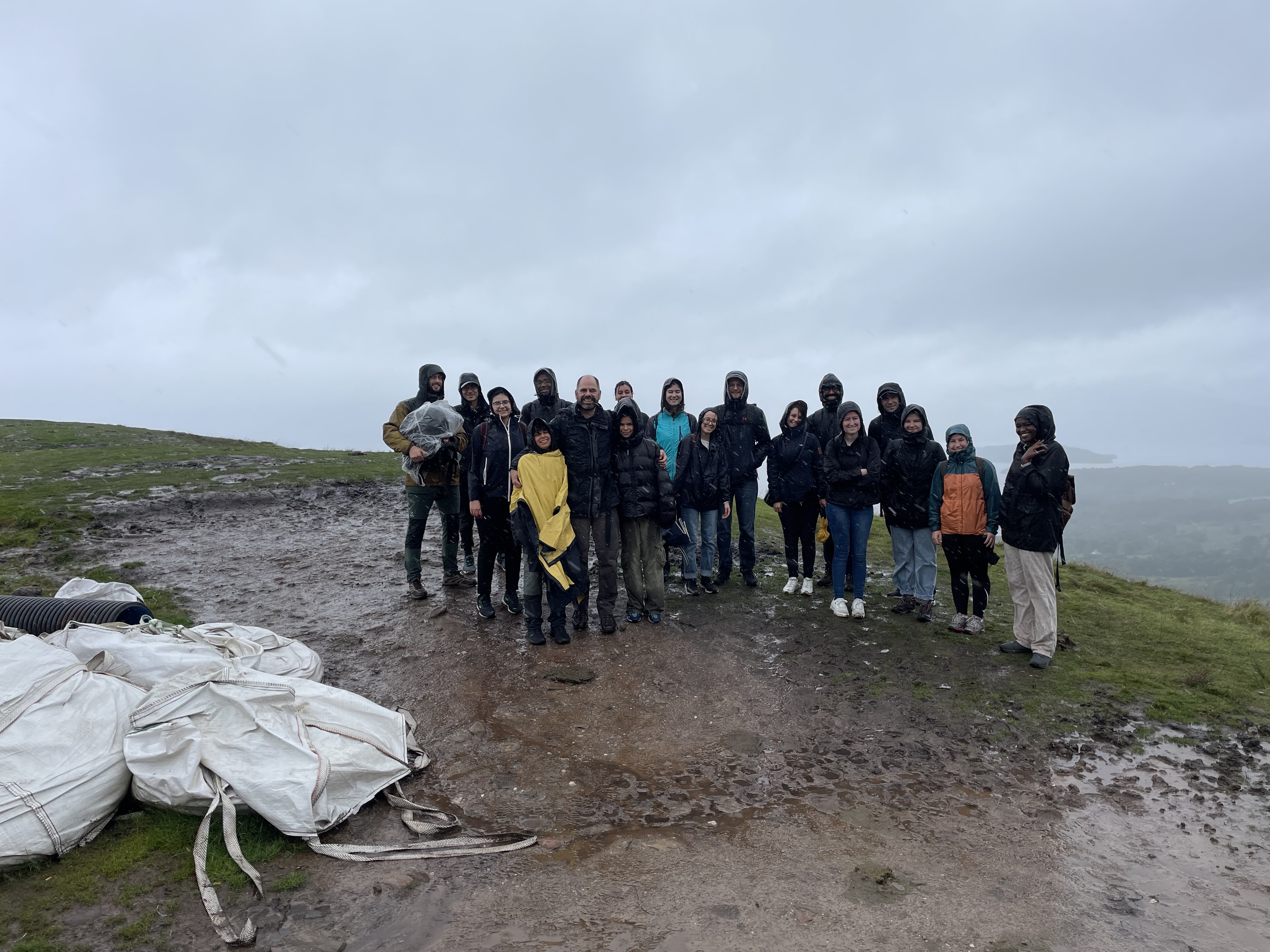
But we had a nice Dinner at the Bothy :-)
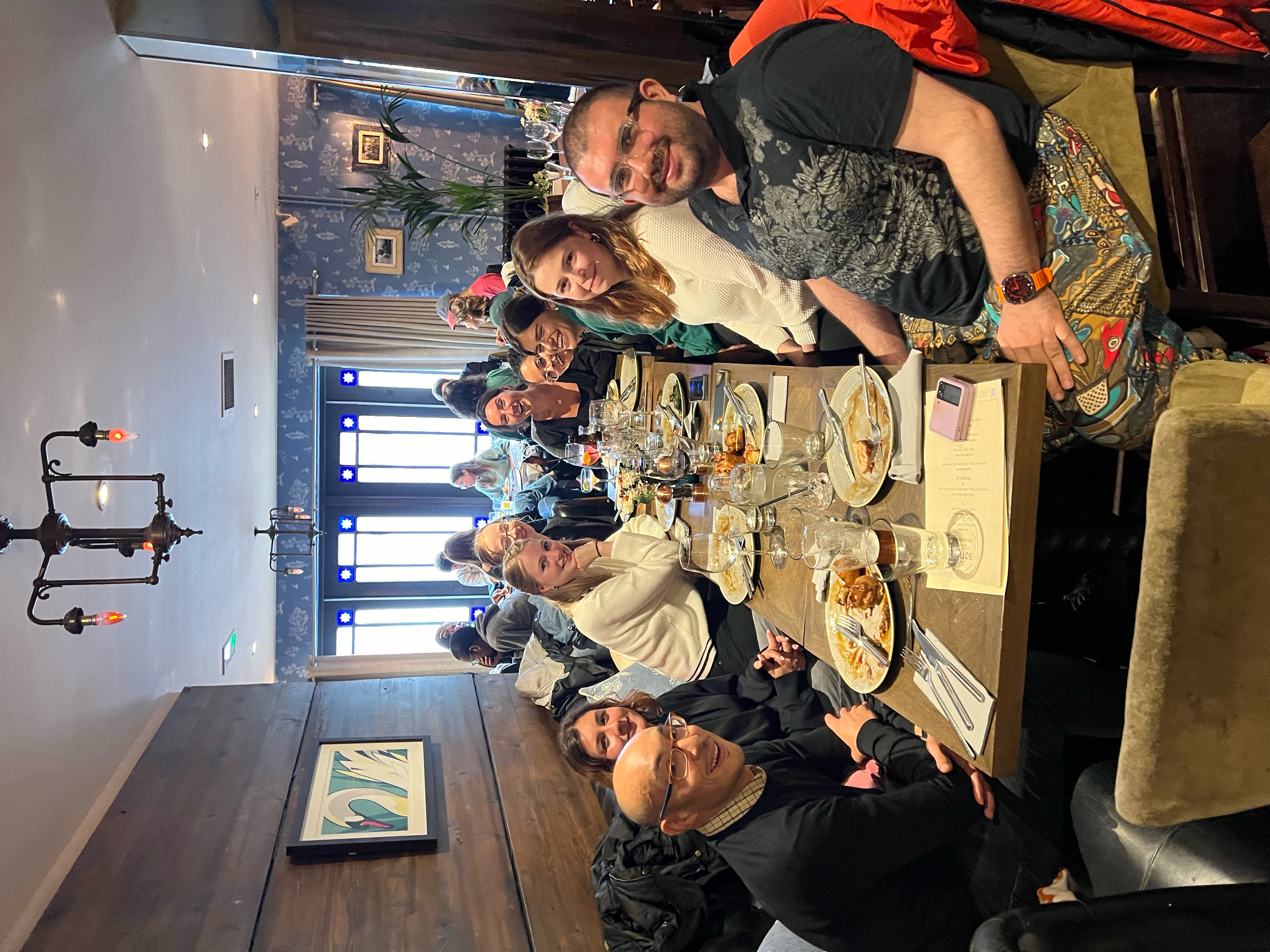
2023
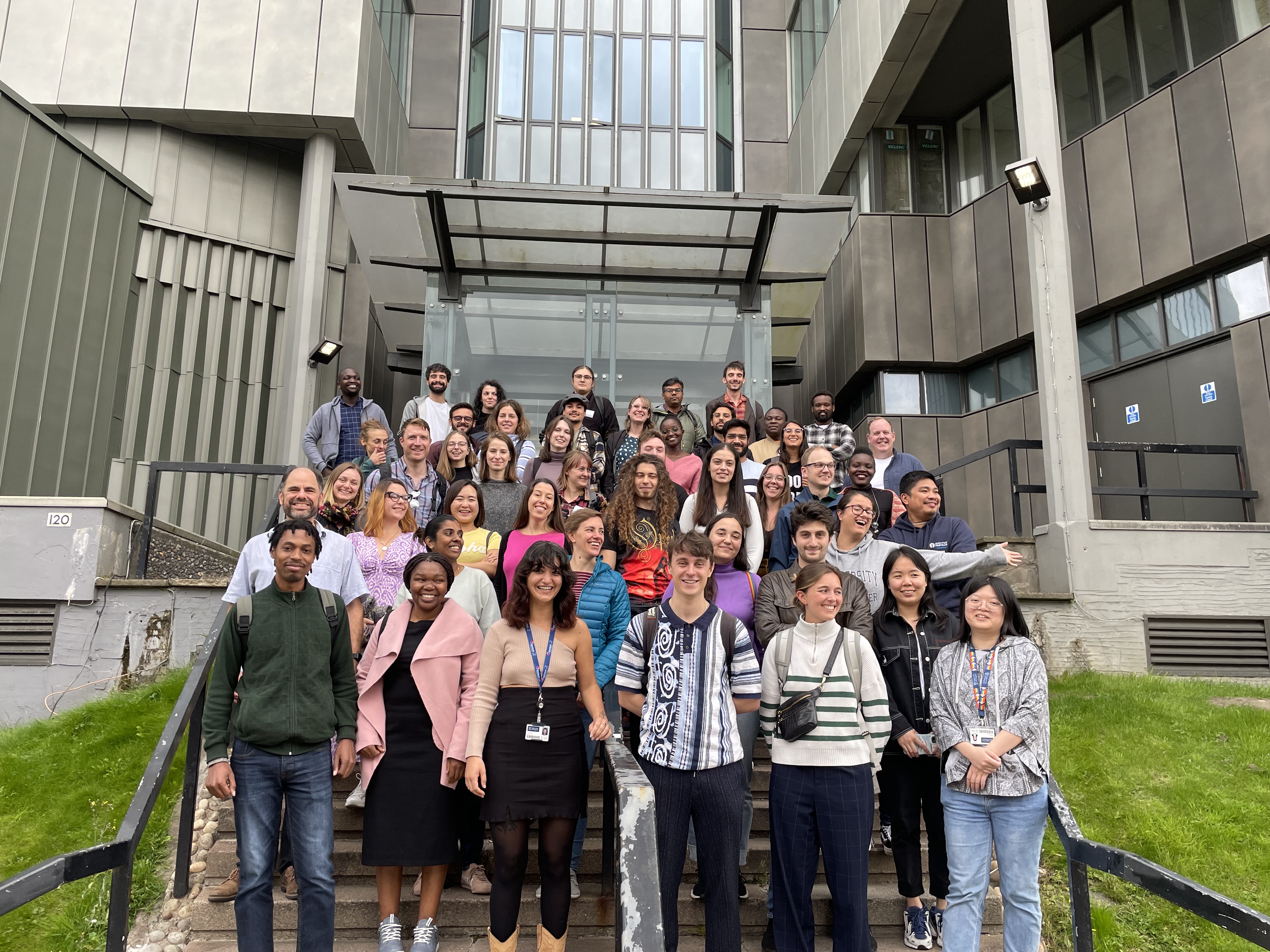
Conic Hill 2023 - less wet and not too hot!
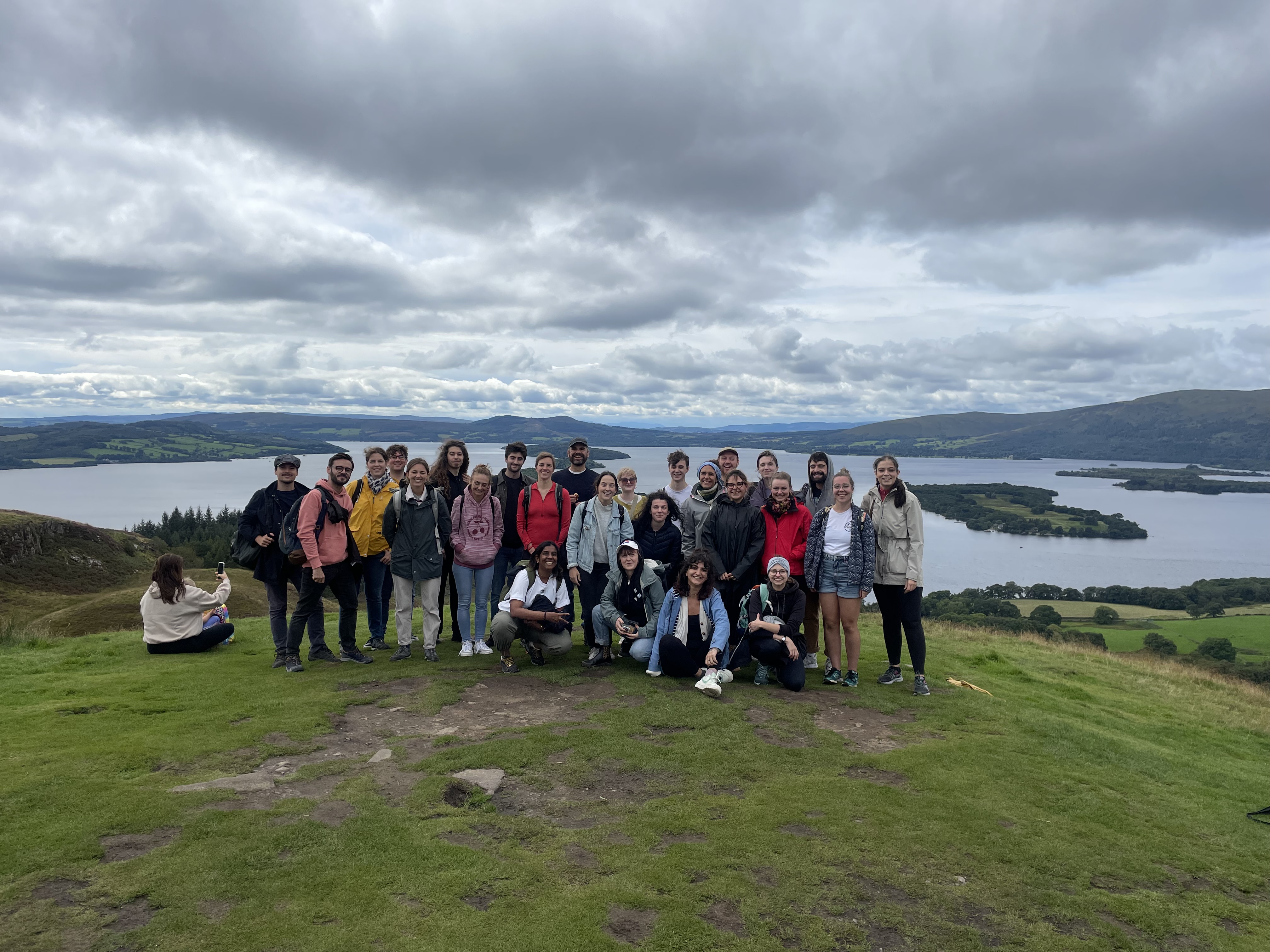
The new teaching stars!
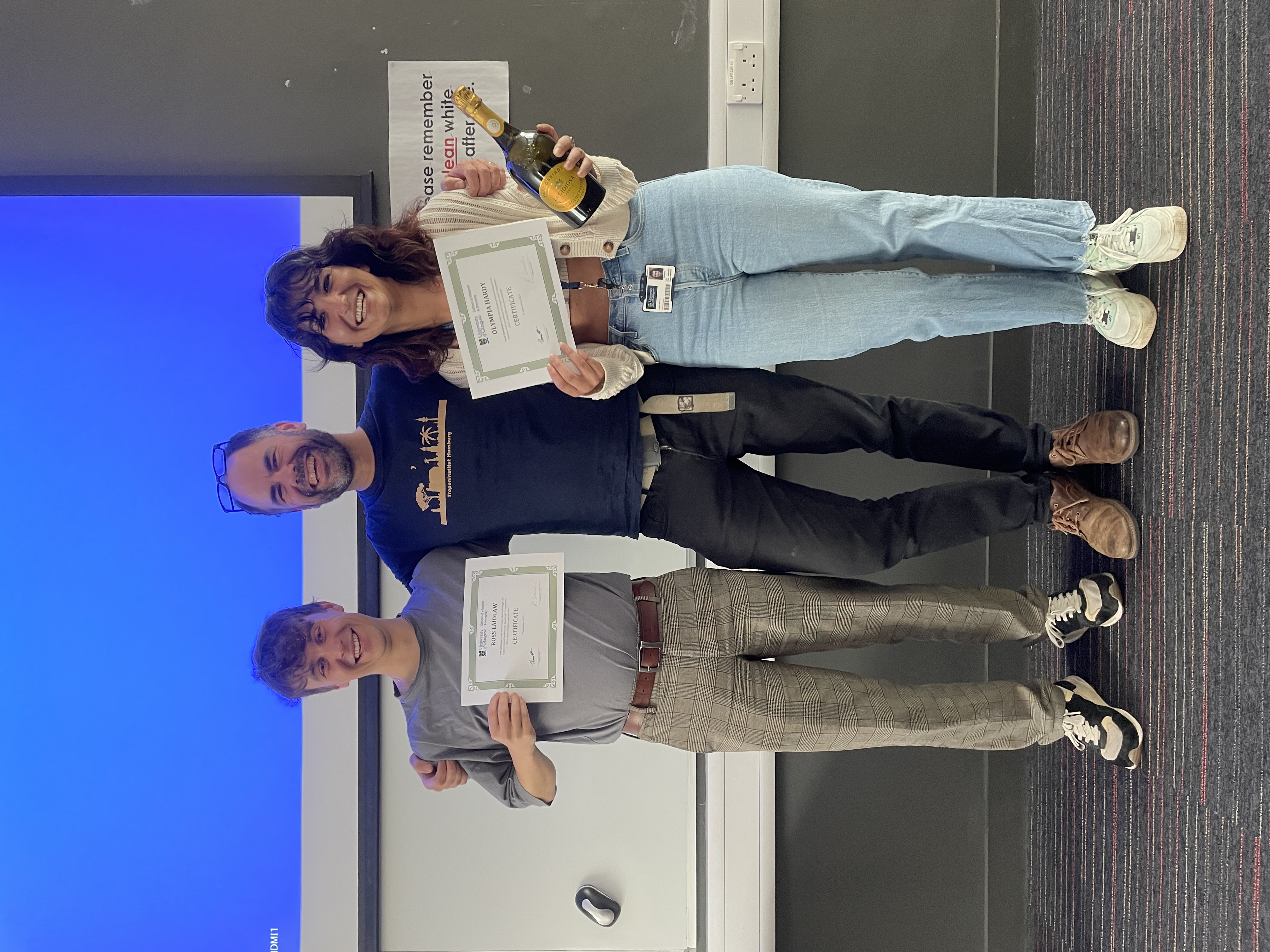
To come, foto from 2018 - 2022, need to get T4 more efficient for the pictures...

